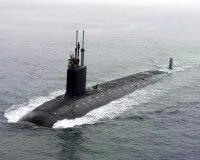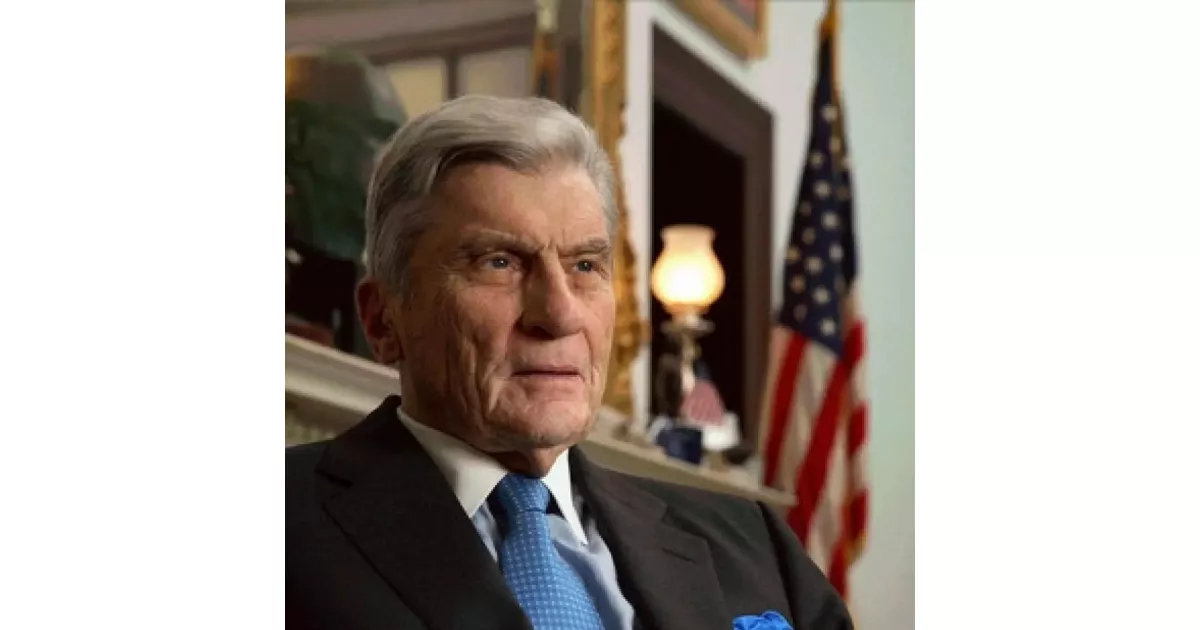John William Warner III was an American lawyer and politician. He served as the United States Secretary of the Navy from 1972 to 1974 and was a Republican U.S. Senator from Virginia for five terms, from 1979 to 2009. During his tenure in the Senate, he held key positions including Chairman of the Senate Armed Services Committee from 1999 to 2001 and again from 2003 to 2007, and Chairman of the Senate Rules Committee from 1995 to 1999.
February 18, 1927: Birth of John William Warner III
John William Warner III was born on February 18, 1927, in Washington, D.C.
January 1945: Enlistment in the U.S. Navy
John Warner enlisted in the U.S. Navy in January 1945, shortly before his 18th birthday.
February 1945: Graduation from Woodrow Wilson High School
John Warner graduated from Woodrow Wilson High School in February 1945.
1949: Graduation from Washington and Lee University
John Warner graduated from Washington and Lee University in 1949.
October 1950: Joining the U.S. Marine Corps
John Warner joined the U.S. Marine Corps in October 1950 after the outbreak of the Korean War.
1953: Law Degree and Clerkship
In 1953, John Warner received his law degree from the University of Virginia and became a law clerk.
1956: Assistant Prosecutor
John Warner became an assistant prosecutor in the office of the United States Attorney for the District of Columbia in 1956.
August 1957: Marriage to Catherine Conover Mellon
In August 1957, Warner entered into a marriage with Catherine Conover Mellon, an heiress from the prominent banking family and an art collector's daughter. This union provided Warner with both financial resources and valuable social connections that proved advantageous for his political aspirations. The couple had three children together—Virginia, John IV, and Mary—before divorcing in 1973.
1960: Private Law Practice and Political Involvement
John Warner entered private law practice and joined Hogan & Hartson in 1960. He was also involved in Richard Nixon's presidential campaign.
1968: Support for Nixon's Presidential Campaign
John Warner provided significant funds and time to Richard Nixon's successful presidential campaign in 1968.
February 1969: Appointment as Under Secretary of the Navy
After contributing to Nixon's presidential campaign, John Warner was appointed Under Secretary of the Navy in February 1969.
1969: Appointment as Under Secretary of the Navy
In 1969, John Warner was appointed as the Under Secretary of the Navy in the Nixon Administration.
May 4, 1972: Appointment as Secretary of the Navy
On May 4, 1972, John Warner succeeded John H. Chafee as Secretary of the Navy.
1972: Appointment as Secretary of the Navy
In 1972, John Warner was appointed as the United States Secretary of the Navy.
1973: Divorce from Catherine Conover Mellon
In August 1957, Warner entered into a marriage with Catherine Conover Mellon, an heiress from the prominent banking family and an art collector's daughter. This union provided Warner with both financial resources and valuable social connections that proved advantageous for his political aspirations. The couple had three children together—Virginia, John IV, and Mary—before divorcing in 1973.
1974: End of Term as Secretary of the Navy
John Warner's term as the United States Secretary of the Navy ended in 1974.
December 1976: Marriage to Elizabeth Taylor
In December 1976, Warner married renowned actress Elizabeth Taylor in a ceremony held at the Second Presbyterian Church in Richmond, Virginia. This high-profile union, which took place before his election to the Senate, thrust Warner into the public eye.
1978: Entry into Politics
John Warner entered politics in the 1978 Virginia election for U.S. Senate.
1979: Election to the U.S. Senate
John Warner was elected as a Republican U.S. Senator from Virginia in 1979.
November 1982: Divorce from Elizabeth Taylor
Warner's marriage to Elizabeth Taylor ended in divorce in November 1982. He outlived all seven of her husbands, becoming the last surviving spouse.
1984: Re-election to the U.S. Senate
John Warner was re-elected to the U.S. Senate in 1984.
1987: Rejection of Robert Bork's Nomination
In 1987, John Warner was one of six Republicans who voted against Robert Bork's nomination to the Supreme Court.
1990: Unopposed Re-election
John Warner faced no Democratic opposition in his 1990 re-election bid.
1990: Re-election to the U.S. Senate
John Warner was re-elected to the U.S. Senate in 1990.
1994: Vote Against Assault Weapons Ban
John Warner voted against the 1994 Assault Weapons Ban.
1995: Chairman of the Senate Rules Committee
John Warner began serving as the Chairman of the Senate Rules Committee in 1995.
1996: Endorsement of Mark Warner
In a notable display of political sportsmanship, Warner endorsed Mark Warner, his former rival from the 1996 election, to succeed him in the Senate in 2008.
1996: Re-election to the U.S. Senate
John Warner faced a challenging re-election campaign in 1996 but ultimately prevailed.
1996: Senate Teller of Electoral Votes
John Warner served as a Senate teller of electoral votes in the 1996 United States Presidential election.
1999: Chairman of the Senate Armed Services Committee
John Warner served as Chairman of the Senate Armed Services Committee from 1999 to 2001.
1999: Vote on Gun Show Loophole
John Warner was one of only five Republicans to vote to close the gun show loophole in 1999.
2001: End of First Term as Chairman of the Senate Armed Services Committee
John Warner's first term as Chairman of the Senate Armed Services Committee ended in 2001.
2002: Unopposed Re-election
John Warner faced no Democratic opposition in his 2002 re-election bid.
2002: Re-election to the U.S. Senate
John Warner won re-election to the U.S. Senate in 2002.
December 2003: Marriage to Jeanne Vander Myde
In December 2003, Warner married Jeanne Vander Myde, a real estate agent and widow of Paul Vander Myde, a defense department official during the Reagan administration.
2003: Second Term as Chairman of the Senate Armed Services Committee
John Warner began his second term as Chairman of the Senate Armed Services Committee in 2003.
June 15, 2004: Vote to Expand Hate Crime Laws
On June 15, 2004, John Warner voted to expand hate crime laws to include sexual orientation.
2004: Support for Assault Weapons Ban Reauthorization
John Warner co-sponsored efforts to reauthorize the assault weapons ban in 2004.
May 23, 2005: Gang of 14 Compromise
On May 23, 2005, Senator John Warner played a key role as part of the "Gang of 14," a group of centrist senators who brokered a compromise on the proposed use of the judicial filibuster. This compromise prevented the Republican leadership from implementing the "nuclear option" and allowed for a vote on three of President Bush's appellate court nominees.
December 30, 2005: Military Commissions Act of 2006
Warner's vote on the Military Commissions Act of 2006, which included a provision granting retroactive immunity to U.S. officials for acts of torture and abuse committed before December 30, 2005, drew criticism from human rights advocates.
2005: Continued Support for Assault Weapons Ban Reauthorization
John Warner continued to support efforts to reauthorize the assault weapons ban in 2005.
September 17, 2006: Concerns Over Treatment of US Personnel
On September 17, 2006, Senator Warner expressed concern over the treatment of U.S. military and intelligence personnel in future wars. He feared that the Bush administration's approach to fighting terrorism was jeopardizing the safety of U.S. personnel.
October 17, 2006: Military Commissions Act Signed into Law
On October 17, 2006, the Military Commissions Act, which Warner helped shape, was signed into law. While the act sparked controversy over its provisions related to interrogation techniques and the Geneva Conventions, Warner defended his role, arguing that it upheld the principles of fair trials.
March 2007: Disagreement with Chairman of the Joint Chiefs
In March 2007, Warner publicly disagreed with the Chairman of the Joint Chiefs, Peter Pace, regarding his views on homosexuality, stating his strong opposition to the idea that homosexuality was immoral.
August 31, 2007: Announcement of Retirement
John Warner announced on August 31, 2007, that he would not seek re-election to the Senate in 2008.
2007: Cosponsoring America's Climate Security Act
In 2007, Warner showed his commitment to environmental issues by cosponsoring America's Climate Security Act, commonly known as the Cap and Trade Bill. This bill aimed to regulate carbon emissions in the U.S. and align the country with the Kyoto Protocol's objectives.
2007: End of Second Term as Chairman of the Senate Armed Services Committee
John Warner's second term as Chairman of the Senate Armed Services Committee ended in 2007.
September 2008: Joining the Gang of 20
Warner joined the bipartisan "Gang of 20" in September 2008 to advocate for comprehensive energy reform. This group aimed to pass legislation that promoted state-level decision-making on offshore drilling and allocated significant funds for conservation and alternative energy sources.
October 2008: Supporting the Emergency Economic Stabilization Act
During the financial crisis of 2008, Warner voted in favor of the Emergency Economic Stabilization Act, demonstrating his support for government intervention to stabilize the economy.
December 12, 2008: National Intelligence Distinguished Public Service Medal
In recognition of his contributions to national intelligence, Warner was awarded the inaugural National Intelligence Distinguished Public Service Medal on December 12, 2008, by the Office of the Director of National Intelligence.
2008: Endorsement of Mark Warner
In a notable display of political sportsmanship, Warner endorsed Mark Warner, his former rival from the 1996 election, to succeed him in the Senate in 2008.
2008: Decision Not to Seek Re-election
John Warner announced his decision not to seek re-election to the U.S. Senate in 2008.
January 3, 2009: End of Senate Term
John Warner's term in the Senate ended on January 3, 2009.
January 8, 2009: USS John Warner Naming Announcement
On January 8, 2009, the Secretary of the Navy announced that the next Virginia-class submarine would be christened the USS John Warner, a testament to his long service in the Senate, particularly his work on the Armed Services Committee.
February 19, 2009: Honorary Knight Commander of the Order of the British Empire
On February 19, 2009, the British Embassy in Washington, D.C., revealed that Queen Elizabeth II would bestow upon John Warner the honorary title of Knight Commander of the Most Excellent Order of the British Empire (KBE). This honor recognized his significant contributions to fostering a strong relationship between the American and British military forces.
2009: Retirement from the U.S. Senate
John Warner retired from the U.S. Senate in 2009 after serving for five terms.
May 2, 2013: Groundbreaking for the Senator John W. Warner Center for Advanced Military Studies
On May 2, 2013, a groundbreaking ceremony took place for the Senator John W. Warner Center for Advanced Military Studies at Marine Corps University in Quantico, Virginia. The center, named in honor of Warner's distinguished career and service in the military and the Senate, serves as a hub for the Marine Corps' educational and historical institutions.
2014: Endorsement of Mark Warner
Warner maintained his support for Mark Warner in 2014, endorsing his bid for reelection to the Senate.
August 1, 2015: USS John Warner Commissioning
The USS John Warner (SSN-785), the twelfth Virginia-class submarine, was officially commissioned into service on August 1, 2015, at a ceremony held at Naval Station Norfolk. This marked a significant honor for Warner, solidifying his legacy in naval history.
September 28, 2016: Endorsement of Hillary Clinton
On September 28, 2016, Warner publicly endorsed Hillary Clinton for the presidency, citing her history of working across the aisle.
2017: Endorsement of Ed Gillespie
While generally supporting Democrats, Warner did endorse Republican Ed Gillespie for Governor of Virginia in 2017.
2018: Endorsements in 2018
Warner continued to be involved in politics after retiring from the Senate, endorsing Democrats Tim Kaine for Senate and Abigail Spanberger and Leslie Cockburn for Congress in 2018.
2020: Statement on Trump's Fitness for Office
In 2020, Warner joined over 130 former Republican national security officials in signing a statement questioning President Trump's fitness for a second term and expressing their support for Joe Biden.
2020: Endorsements in 2020
In the 2020 elections, Warner endorsed Joe Biden for President and continued his support for Mark Warner's Senate reelection campaign.
May 25, 2021: Death of John Warner
John Warner passed away on May 25, 2021.
June 23, 2021: John Warner's Funeral
On June 23, 2021, John Warner's funeral took place at Washington National Cathedral. Notable figures such as President Joe Biden, Senators Tim Kaine and Mark Warner, and Admiral Michael Mullen delivered speeches at the ceremony.
Mentioned in this timeline

Elizabeth II reigned as Queen of the United Kingdom and...

Hillary Diane Rodham Clinton is an American politician lawyer and...

Joe Biden a member of the Democratic Party served as...

A submarine is a watercraft capable of independent operation underwater...

Christmas is an annual festival celebrated on December th commemorating...

Washington D C is the capital city and federal district...
Trending

8 months ago NHL teams consider reuniting Toews and Kane during Patrick Kane's free agency.
Kevin Warsh is an American financier and bank executive He is notable for serving as a member of the Federal...

9 months ago Oklahoma Dominates NCAA Women's Gymnastics Championship 2025, UCLA takes second place after defeat.

2 months ago Trade Rumors Swirl: LaVine, DeRozan, and Potential NBA Team Swaps Discussed
3 months ago Islanders face Rangers in first derby; betting promos available for the game.

Sha'Carri Richardson is a celebrated American track and field sprinter specializing in the and metres Her prominence surged in while...
Popular

Thomas Douglas Homan is an American law enforcement officer who...

William Franklin Graham III commonly known as Franklin Graham is...

XXXTentacion born Jahseh Dwayne Ricardo Onfroy was a controversial yet...

Jupiter is the fifth and largest planet from the Sun...

Kristi Noem is an American politician who has served as...

Instagram is a photo and video-sharing social networking service owned...
